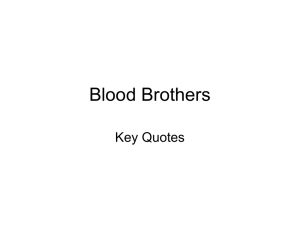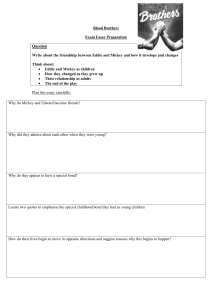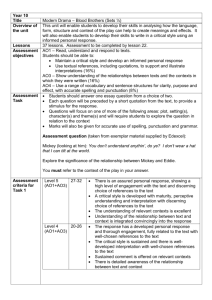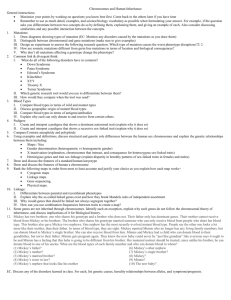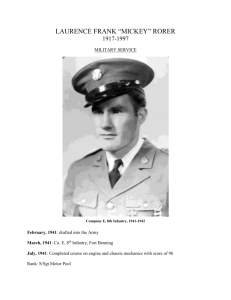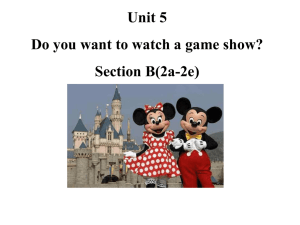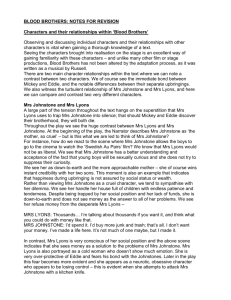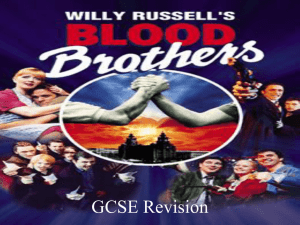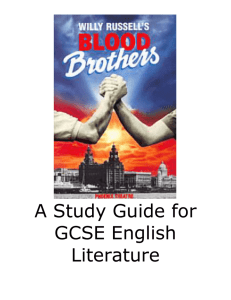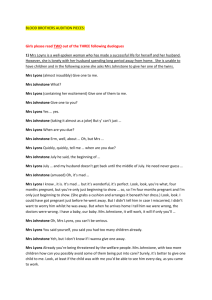Blood Brothers: Drama Response Guide
advertisement
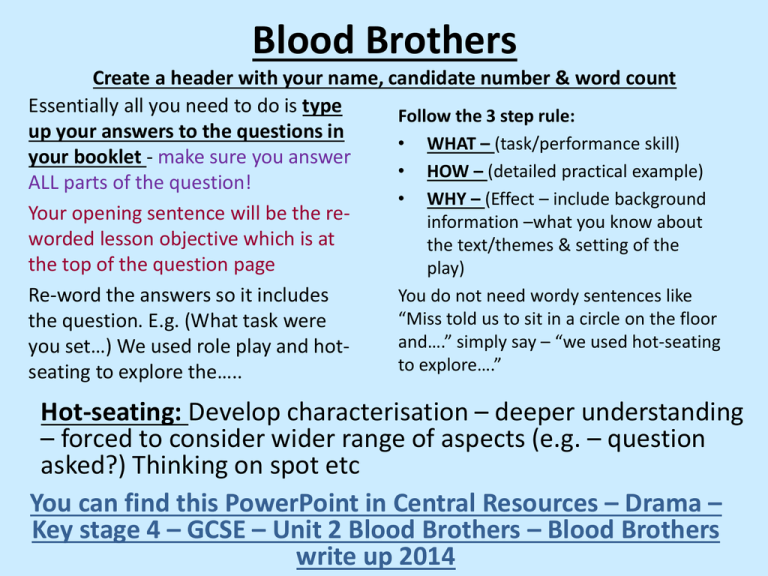
Blood Brothers Create a header with your name, candidate number & word count Essentially all you need to do is type Follow the 3 step rule: up your answers to the questions in • WHAT – (task/performance skill) your booklet - make sure you answer • HOW – (detailed practical example) ALL parts of the question! • WHY – (Effect – include background Your opening sentence will be the reinformation –what you know about worded lesson objective which is at the text/themes & setting of the the top of the question page play) Re-word the answers so it includes You do not need wordy sentences like “Miss told us to sit in a circle on the floor the question. E.g. (What task were and….” simply say – “we used hot-seating you set…) We used role play and hotto explore….” seating to explore the….. Hot-seating: Develop characterisation – deeper understanding – forced to consider wider range of aspects (e.g. – question asked?) Thinking on spot etc You can find this PowerPoint in Central Resources – Drama – Key stage 4 – GCSE – Unit 2 Blood Brothers – Blood Brothers write up 2014 Exemplar materials – Role Play “For Mickey I instinctively used a strong scouse accent showing he’s from a part of Liverpool heavily populated by workers native to the area. Running and jumping across the room, miming a pistol and making sound effects when “firing” the gun showed both his age (seven) and the way he has always interacted with other children, helping me understand that Mickey, lacking the money for real toys, relies on imagination and playmates for entertainment, playing well-known child’s game ‘Cowboys and Indians’. In contrast, when playing as Eddie …” “To explore the character further, we used hot seating, which is used to enable the actor to understand their character, by asking and responding to questions in character. In the hot seating I discovered Mickey has a short attention span. This was shown by looking around, not at the person asking the question, to show how Mickey cannot stay still, and doesn’t pay attention, as he has never been paid much attention. These character traits linked straight into a still image, with me sprawled on the floor looking away from Libbie (Eddie), whilst Libbie stood to the side looking quizzically down at me. The levels showed how Mickey was the lower class boy as he was lower than Edward. The still-image also showed Mickey’s lack of attention, as Mickey is not focused on Edward at all. Edward’s quizzical look shows how he is not used to people acting childishly, as he is only used to adult company” Obviously you cannot simply copy this – that is plagiarism but do follow the structure, level of detail and constant linking back! Narration Playwrights intentions: Why superstition? each of the major characters is presented as being trapped and plagued by various kinds of bad luck. Russell forces us to question whether life pans out because of natural rather than supernatural reasons; because of the way we are educated and live. So superstition & fate are reoccurring themes highlighting death, betrayal, bad luck & loss of money but also designed to make us question if these things really exist or if the blame falls on the way we are treated due to social class and education. Role of the narrator: • Act as devil • Foreshadowing deaths of twins • Constant reminder of themes and downwards spiral to ‘fate’ • Encourages audience to question. Make sure you link WHAT strategies you used to highlight the above, HOW you used them (describe what you practically & vocally did) and WHY this was effective – remember to refer to the points on this slide & your understanding of Blood Brothers. You might want to use a text box to highlight the section of script used & annotate using other text boxes and arrows to save words. His minds gone dancing - Depression Playwrights intentions: Depression: Russell poses the point that it doesn’t matter what social class you are from – anyone can become depressed. Highlighted through the characters of Mickey & Linda & the continual references to Marilyn Munroe. However the lack of education and money allows them no real chance of happiness as they are continually trapped within societies constraints especially during economic downturn. Challenges Thatcher's beliefs of ‘if you work hard, you will be successful’ Focus on the detail in description of your physical and vocal exploration. Use the Drama Glossary to aid description (found in Central Resources – Drama – Key stage 4 – Drama Glossary Booklet) You might want to use a text box to highlight the section of script used & annotate using other text boxes and arrows to save words. We created a series of still images physicalising lines from the song exploring the use of symbolism and highlighting the playwright’s intentions of emphasising the importance of individual events so that the audience can reflect on the moments leading to the brother’s deaths. The narrator is a crucial part of the play – he serves as the storyteller, but also represents the Devil, consistently reminding the audience of the Brothers’ fate, towards the ending appearing more and more frequently, symbolising the imminent death of the twins. Echoing this line at different times in a whisper created a menacing, chaotic atmosphere and communicated the meaning behind the superstition (when miners died, it was traditional that their shoes were placed on their family’s table), relating to the theme of imminent death within the play. To show this we used the scene in the text where Mickey discovers the gun Sammy has hidden. Shoes upon the table, An’ a spiders been killed. Someone broke the lookin’ glass A full moon shinin’ An’ the salt’s been spilled. You’re walkin’ on the pavement cracks One group used physical theatre particularly effectively showing a broken mirror, distorting their movements and stance, portraying shards of glass in a circle whilst one person crouched in the middle gazing at the floor with a defeated expression, linking to the idea that breaking a mirror can destroy a soul. I felt this was effective in highlighting the idea that the brothers’ lives are shattered due to superstition, the “curse” placed on them both as children. Showing the moment Edward takes a locket from Mrs Johnstone before moving to the countryside linked to the “curse” placed on the twins by Mrs Lyons after the boys have been separated – despite Mrs Johnstone’s superstition, believing that the children could die if they find out they are brothers, she cannot help speaking to Edward and giving him the locket, something to remember her by – meaning, in effect, she’s “walking on pavement cracks”, threatening to release terrible danger by giving Eddie a link to her and Mickey. We showed this by portraying Mrs Johnstone with her hand on Eddie’s shoulder, an expression of concern masked with false happiness on their face, and somebody standing up straight as the Narrator behind them, stern and grim, creating the impression of an inescapable fate. Annotating key moments of text can help you to be more concise & allows you to combine evaluation of your own & others work. ‘His minds gone dancing’ To look at the theme of depression and use of symbolism in the play we created a set of still images and transitions based on the lyrics from the song ‘His mind’s gone dancing’. The still images showed Mickey’s ‘thoughts’ sat around him, Mickey being forced the antidepressant and all four actors including Mickey sat on the floor, showing how he has been beaten. We used distorted movement during our first transition; 3 people spinning around Mickey with splayed hands and taught muscles, showing snippets of memories such as when he and Eddie became blood brothers. Overwhelming emotions are surrounding Mickey, and spinning his mind out of control after he assists Sammy with the murder. This causes his depression, and is another factor that leads to his downfall. The spinning also represents the dancing that is pre-mentioned in the play, which had always been a positive past time, as it was one of the poor’s few luxuries, but now has a twisted, negative connotation. Another group showed the theme of depression by moving in unison around one person, and creeping up behind him, to show how it was a cloud of depression that crept up on Mickey, and that the depression was bigger than him as he was outnumbered. We used still images and transitions to symbolise Mickey’s thoughts and mind. The images gave the piece moments of stillness, showing how Mickey could have moments of lucidity during his depression. I think it was important to recognise both of these states of mind. This section gave me the chance to see how much Mickey struggles with his depression, and it also helped me start to realise how many different things contributed to the twin’s downfall in the end of the play. Insanity & paranoia – Mrs J & Mrs L Playwrights intentions: Social class divide: Russell highlights how wealth brings privilege, even down to the way that the Lyons’ and the Johnstone’s are treated by the law. The four main characters can be seen to be social stereotypes, presented dramatically in order to emphasise certain important differences in social class and opportunities. Russell’s main intention is to highlight the unfairness that it results in. Highlighted through: • Difference in language (some highlighted through phonetics) • Sentence length • Use of punctuation • Sentence construction Mrs J & Mrs L – Exemplar We used emotion memory, enabling us to explore and develop our understanding of the emotions needed for this section and discover how we needed to use contrast to show the women’s different social class and their different personalities and ways of life. The emotion memory helped me to capture Mrs Johnstone’s anger; I sped up my speech and made it short, showing the confrontation and frustration. Slowing down and pausing at certain points helped emphasize the meaning behind certain words. In contrast, Mrs Lyons’ speech featured long, thought out sentences, such as ‘following me like a shadow’ showing how she had been thinking about this for a long time. Looking at the mothers like this helped me to appreciate how many different factors affected the ending of this play, and made me realise that even though both mothers were trying their hardest to do the best for their sons, it was inevitable that the boys would, as the playwright had always intended.
